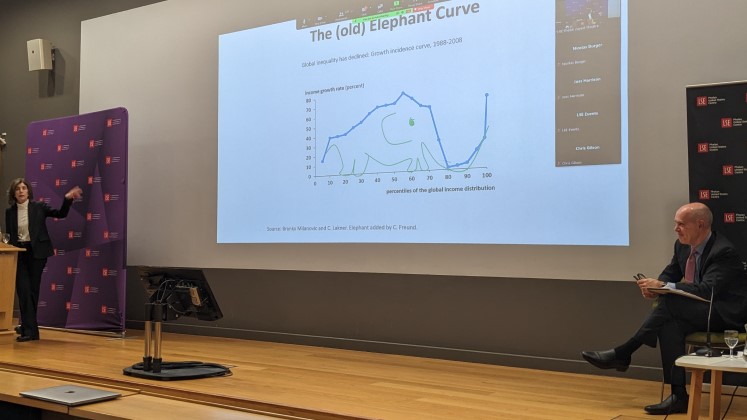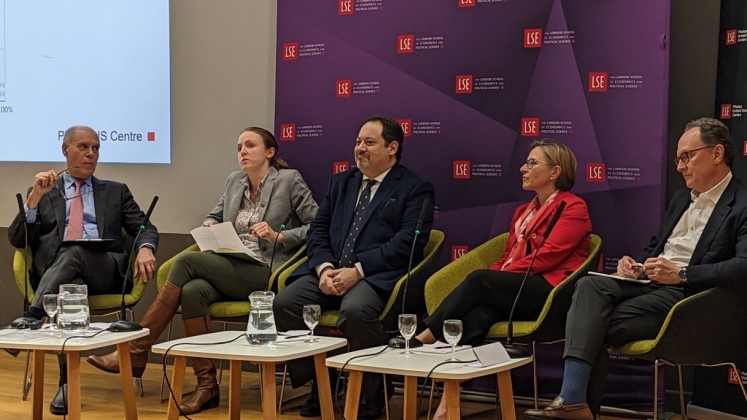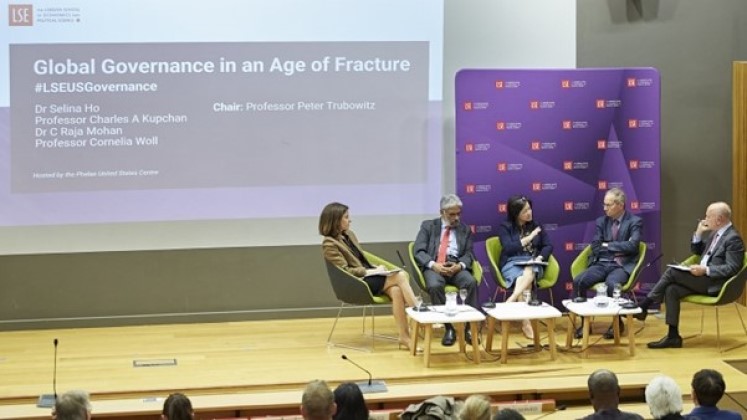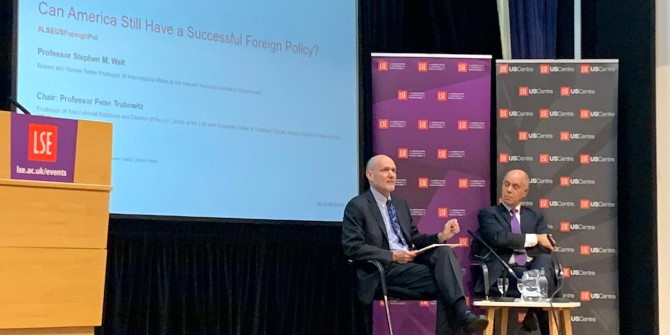 On Thursday 1 June, the Phelan US Centre hosted the in-person and online event ‘Global Governance in an Age of Fracture’ with Selina Ho (National University of Singapore), Charles A Kupchan (Georgetown University), C. Raja Mohan (Asia Policy Institute), and Cornelia Woll (Hertie School). Jade Plancke gives an overview of the event and the Q&A segment.
On Thursday 1 June, the Phelan US Centre hosted the in-person and online event ‘Global Governance in an Age of Fracture’ with Selina Ho (National University of Singapore), Charles A Kupchan (Georgetown University), C. Raja Mohan (Asia Policy Institute), and Cornelia Woll (Hertie School). Jade Plancke gives an overview of the event and the Q&A segment.
With the declining support for traditional institutions such as the UN and WTO, on Thursday, 1 June, a panel chaired by Phelan US Centre Director, Professor Peter Trubowitz, brought together leading experts on International Affairs to explore the topic of global governance in an age of fracture. To begin the discussion, Professor Peter Trubowitz asked the panel to explain what they take to be the defining global challenges facing us in the common years.
Professor Charles A Kupchan, from Georgetown University and Senior Fellow at the Council of Foreign Relations, discussed to two interrelated challenges. The first is the revival of nationalist populist movements. Several data points show that the political tangent is swinging back to populism. He argues that this poses a challenge, especially in a globalized multi-polar world. Indeed, a globalized world that faces the rise of populist nationalist movements and does not have a “captain” gives rise to serious questions on how we will preserve stability and tackle pressing issues like climate change.
Dr. Selina Ho, Assistant Professor and Co-Director of the Centre on Asia and Globalization, National University of Singapore, pointed out China and the United States’ lack of leadership. While Biden is trying to restore US leadership, ideological divisions and the fragmentation of American society challenge this ambition. On the other hand, China is not trusted by the West. And against conventional wisdom, it is not trusted by the East either. In addition, China’s domestic challenges (poverty, unemployment, etc.) prevent it from taking leadership. The middle powers, like countries in Southeast Asia, are asking if the leadership should come from them. A new form of world order is arising.
Dr. C Raja Mohan, Senior Fellow with the Asia Society Policy Institute in Delhi, and a Visiting Research Professor at the National University of Singapore, disagrees with Professor Kupchan and is convinced that the “system has more legs than it might seem.” He claims that the West’s decline has been discussed in India since the 1980s, and that this shows the resilience of the United States. This can be seen with, for example, the United States’ ability to create alliances and new coalitions. He further argues the challengers to the West have weaknesses of their own; for example, China’s power comes from its access to the American market. He argues that we should not say that the West is in decline, but rather that the United States needs to rearrange its hierarchy to accommodate others.
Professor Cornelia Woll, President of the Hertie School and Professor of International Political Economy, takes a different approach to the initial question posed by Professor Peter Trubowitz. She argues that reforming the international financial and monetary architecture is the biggest challenge. We have systems that are dominated by Western hegemony. China is developing a new system as we move towards a multi-polarized world. For example, China now provides global swap lines to struggling countries; this is an entirely separate system. In the architecture of financial stability, a parallel world has developed. This poses challenges when countries default or are at risk of defaulting. Yet, the US is opposed to reforming the system, mainly for the domestic political forces that will oppose it. Yet, if we do not address this challenge, how do we help those struggling when we need financial solidarity? We cannot, and this poses a challenge in addressing issues like climate change, public health crises, the effects of war, etc.
In the Q&A session, several topics were discussed; the role of BRICS and Europe in this new world order, the threat of China and the extent to which the US power was in decline, and how this new world order is different from the liberal world order. A Ph.D. student at King’s College asked panelists to explain the extent to which China was a threat to current global governance. Cornelia Woll replied that China was not a threat but part of the solution. Indeed, the current system does not work. The question is now, how do we create a multilateral world that works? For Selina Ho, China is not a threat per se but has a different set of economic rules. The question is whether these rules are what the rest of the world wants to implement.
Listen to a Ballpark podcast interview with the Lloyd George Study Group on Spotify
- Listen to a podcast of the event [LSE Player]
- Featured image credit: © 2023 Robert Irving/LSE
- Please read our comments policy before commenting.
- Note: This article gives the views of the author, and not the position of USAPP – American Politics and Policy, nor the London School of Economics.
- Shortened URL for this post: https://bit.ly/43Iq8UG






